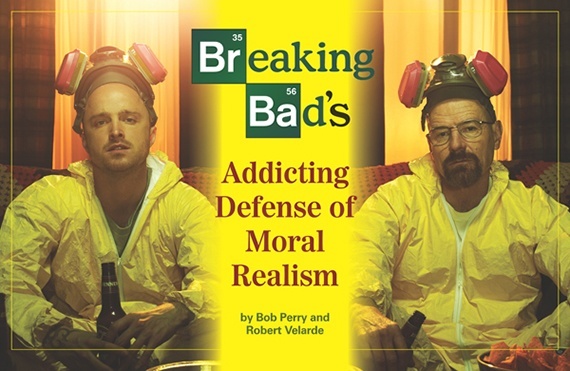This article first appeared in Christian Research Journal, volume 36, number 05 (2013). For further information or to subscribe to the Christian Research Journal go to: http://www.equip.org/christian-research-journal/
AMC’s gritty, award-winning television show Breaking Bad is more than a drama—it’s a tragedy. A slick, well-produced program with superb acting and storytelling, it is also a morality tale about the devastating downfall of its main character.1 Along the way, viewers not only witness Walter White’s moral free fall but also see the results of rampant moral relativism. “
[One] way to assess the validity of a moral system,” say apologists Greg Koukl and Francis Beckwith, “is to see what kind of person it produces…the quintessential relativist is a sociopath, one with no conscience. This is what relativism produces.”2
MEET WALTER WHITE
One might think that Bryan Cranston—who viewers would recognize from his previous roles as Jerry Seinfeld’s dentist or the goofball father, Hal, in the sitcom Malcolm in the Middle—would have trouble pulling off the part of a psychopathic moral monster. But as the main character in the hit series Breaking Bad, Cranston’s White convincingly sells the persona. Beginning as a Walter Mitty-esque high school chemistry teacher and loving family man who is diagnosed with cancer and desperate for a way to pay for his treatments while still providing for his family, White’s transformation into a ruthless drug cartel kingpin with the mythical alter ego “Heisenberg” is remarkable. Walter is fueled at every step by a relativistic view of the world brought to life by his iconic representation of Nietzsche’s “will to power.”
Walter White’s moral relativism is exposed from the very first episode when, on a ride-along drug bust with his DEA agent brother-in-law, he recognizes one of his own former high school chemistry students (Jesse Pinkman, played by Aaron Paul) escaping the targeted methamphetamine house by jumping from a second floor window. Intrigued by Jesse’s ingenuity, Walter never considers informing his brother-in-law about Pinkman’s elusive move. Instead, he sees Pinkman’s drug business as a possible financial solution to his personal health predicament. Thus begins the White–Pinkman partnership in crime that confronts viewers with more than just a good-guy-gone-bad adventure series. Whether purposeful or not, the story is a study in juxtaposed ethical views. On the one hand, Walter White’s relativistic moral conscience finds any way to rationalize even the most vile and horrific means to his self-indulgent ends. On the other hand, Pinkman’s gut-wrenching emotional distress demonstrates the existential consequences that come with violating the objective moral standards that God wove into the fabric of the universe. If Walter is an icon for the Nietzschean world where God is dead, Jesse is a reflection of the inescapable human condition wherein all men recognize God’s moral standards, whether they attribute their origin to Him or not.
MORAL CONSEQUENCES
We see these competing moral views played out repeatedly in White and Pinkman’s interactions. Walter commits murder, poisons children, hires assassins, and repeatedly deceives not only his business associates (Pinkman included) but also his own family. In fact, the deeper Walt gets into his criminal lifestyle, the quicker he is to deceive in order to cover it up. Repeatedly, Walter weighs his decisions not against any objective moral standard, but against the consequences he (usually wrongly) foresees following from them. Thus begins the incremental descent from his initial motivation to provide for his family, to a more tightly focused self-interest, to all-consuming greed, and finally to the raw pursuit of power over the drug empire he has constructed. The inevitable manifestation of a moral conscience untethered to God has always been a vile human pride.
During a particularly poignant scene in Season Two, Walter enters Jesse’s apartment to find him lying passed out next to his likewise unconscious girlfriend, Jane. In Walter’s eyes, the two have become a problem because the drug-addicted girlfriend has influenced Jesse to use (instead of just “cook”) the drugs he makes. As Walter looks on, Jane begins to choke on her own vomit, and though he is perfectly capable of saving her by simply turning her on her side, Walter watches expressionless as she dies before his eyes. He suppresses the faded remnants of a sense of guilt and then leaves the house, content that the “Jane problem” has been sufficiently solved.
Allowing Jane to die is a turning point in the tragedy of Walter White. In Season One, viewers are moved to pity for Walt. By all accounts he’s a good teacher, loves his wife, cares for his son, and is doing the best he can to provide, even taking a humbling second job at a car wash. But now he stands idly by and watches someone die. As we’ll note later, the consequences of Jane’s death are severe.
THE GRIP OF MORAL REALISM
The storyline weaves the impact of Jane’s death, the suffering of children tangentially connected to the drug underworld, and the diabolical actions of Walter and Jesse into a tapestry of evil that Walter continuously embraces as the cost of doing business. At the same time, and in reaction to the exact same events and circumstances, Jesse Pinkman lives in psychological agony concerning the wake of misery and terror his actions have brought to the world around him. Though Jesse’s decisions are also thick with evil, each one drags his tortured soul deeper into the pain that comes under its tangible moral weight. Caught up in a world from which he repeatedly tries and fails to extricate himself, Jesse’s character reminds the viewer that morality is not simply a matter of weighing differing preferences, but a palpable, relentless tyrant. Aaron Paul’s powerful portrayal of the effects of moral realism is properly haunting and unforgettable.
In its closing episodes, it is Jesse’s realization that he too has become a victim of Walter’s web of diabolical deceit that drives him to a place where he can no longer tread water on the sea of evil in which he is drowning. Here Breaking Bad brings the viewer into a clash of moral worldviews when Walter’s capacity for relativistic rationalization meets Jesse’s screaming demand that “he can’t keep getting away with this!” Evil demands justice.
One of the show’s most powerful techniques is the use of flash forward/flashback to create dramatic anticipation or to remind viewers how far they have been taken down Walter’s road to self-destruction. Near the series’ catastrophic end, a flashback takes us back to the scene of Walter and Jesse’s first methamphetamine “cook” in the New Mexico desert. Walter mumbles to himself as he holds his cell phone practicing how he will lie to his wife regarding his where abouts, and then finally works up the courage to dial the call. In the background, Jesse jumps around the desert in youthful exuberance—sword-fighting with an invisible foe—completely oblivious to the crushing evil that will soon engulf him. After five seasons of gradually being brought to expect the unexpected worst from both of them, the scene is a chilling reminder of the C. S. Lewis devil Screwtape’s exhortation to Wormwood that “the safest road to hell is the gradual one—the gentle slope, soft underfoot, without sudden turnings, without milestones, without signposts.”3
Jesse’s confrontation with moral realism brings him to the sorrowful and psychologically terrifying realization that he cannot escape the consequences of his choices. Unfortunately, Breaking Bad offers him no hint of Christ’s antidote for his inevitable failures. But it is a rare television event that offers such a clear and convincing contrast between the two primary philosophical views of morality. While Jesse writhes in tortured agony, Walter has lost any hint of a moral conscience, having essentially removed himself from the standards of natural law.
THE BANKRUPTCY OF MORAL RELATIVISM
Throughout the show, Walter insists to anyone who will listen that the only motivation for his actions has always been to take care of his family. In the final scene with his wife, however, the subject comes up once again.
“All the things I did, you need to understand,” begins Walt.
His wife interrupts: “If I have to hear one more time that you did this for the family…”
Walter: “I did it for me…I liked it…I was good at it…And I was—really—I was alive.”
In short, Walter White has become the kind of person relativism produces: a sociopath. At the show’s conclusion, as life is slowly slipping from his grasp, Walter’s bloody hand rests on a stainless steel tank in a methamphetamine lab. A wry smile parts his lips, content with the success he has achieved in the purity of a “product” only Heisenberg could manufacture. His last thought is to revel in the only force that has ever motivated him: his own human pride.
Through Jesse, Breaking Bad lets its viewers feel the pain of evil in ways that send chills down our collective spines. Many shows and movies have done that, but the real power in the series lies in Walter White’s demonstration of the bankruptcy of moral relativism and the ends to which it leads.4
NO ORDINARY PEOPLE
Beyond its depictions of morality and immorality, Breaking Bad offers numerous insights apologists can utilize in order to make their case for Christianity.
It takes morality seriously, even if characters such as Walter White do not.
It vividly depicts the real consequences of our moral actions. In the end, for instance, Walt loses everything—his wife, his children, his brother-in-law, and his relationships.
It presents strong depictions of human nature, specifically our capacity and propensity toward sin. The battle of virtue and vice within us is real and the more we favor one side or another, the more our character is shaped for better or for worse. Being made in God’s image, we have potential for greatness, but since we are fallen, broken beings, when we fall, we fall hard.
The program raises serious questions about facing mortality and how we respond to evil and suffering in our lives.
The moral choices we make in life have consequences that we may not see nor consider. We each have the capacity to influence others for good or for bad. This point is made clearly when, as a result of Jane’s death, her father falls into despair, which leads him to make a terrible mistake while on the job as an air traffic controller. Hundreds of people are killed as a result of a plane crash that follows—an event that was set in motion by Walt’s inaction as he watched Jane choke to death.
Breaking Bad offers a tragic example of what happens to someone who removes himself from the God-rooted moral standards that underpin our universe.
All moral systems employ a standard of measurement—a scoring system by which we judge the actions of moral agents and the obligations they hold to other moral agents. We only hold moral obligations to other persons. The differences in competing moral systems depend only on the character of the person(s) to whom we are obliged to act. Under moral realism, that Person is the Creator of the universe. Under moral relativism, that “person” can entail anyone from a collection of like-minded moral agents (a community or culture) to the person we see in the bathroom mirror every morning.
History provides us plenty of examples of group-thinking communities behaving badly. And it doesn’t take much of an imagination to find examples of individuals who have “broken bad.” Absent an objective standard, our moral choices rely only on the latitude we give ourselves for pleasure or for pride. In Walter White, Christian thinkers have a cultural phenomenon who demonstrates that “there are no ordinary people….[We] have never talked to a mere mortal. Nations, cultures, arts, civilisations—these are mortal, and their life is to ours as the life of a gnat. But it is immortals whom we joke with, work with, marry, snub, and exploit—immortal horrors or everlasting splendours.”5
Bob Perry, M.A. (Christian Apologetics) Biola University, is a speaker with the Life Training Institute and an instructor with CrossExamined.org. Access his website and blog at: http://truehorizon.org.
Robert Velarde is author of A Visual Defense (Kregel Publications, 2013), The Wisdom of Pixar (InterVarsity Press, 2010), Conversations with C. S. Lewis (InterVarsity Press, 2008), and more. He received his M.A. from Southern Evangelical Seminary and contributed to Don’t Stop Believin’: Pop Culture and Religion from Ben-hur to Zombies (Westminster John Knox, 2012).
NOTES
- The show’s language, adult situations, and violent nature make it unsuitable for family viewing, but the authors address it because Breaking Bad offers a gripping case study in the inescapability of objective moral reality and the utter bankruptcy and destructiveness of moral relativism.
- Francis Beckwith and Greg Koukl, Relativism: Feet Firmly Planted in Mid-Air (Grand Rapids: Baker Books, 1998), 30–31.
- C. S. Lewis, The Screwtape Letters (New York: Macmillan, 1959), 56.
- White’s moral views are also mixed with unhealthy doses of ethical egoism (a moral system based on self-interest) and utilitarianism (where the end results and the “greatest good” are central), although providing methamphetamine to the masses is hardly the greatest good, as evidenced by the many lives ruined by drugs as depicted in the program.
- C. S. Lewis, The Weight of Glory and Other Addresses (New York: Macmillan, 1980), 19.









